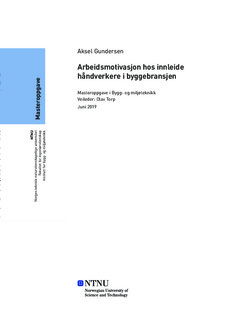Arbeidsmotivasjon hos innleide håndverkere i byggebransjen
Master thesis
Permanent lenke
http://hdl.handle.net/11250/2624301Utgivelsesdato
2019Metadata
Vis full innførselSamlinger
Sammendrag
De siste ti årene har bruken av innleid arbeidskraft hos entreprenører i byggebransjen øktdrastisk, samtidig som bransjen har hatt et fall i produktiviteten på 10 % siden 2000. Deter flere årsaker til at produktiviteten har falt, og flere ulike tiltak trengs for å øke den igjen.Ett av tiltakene kan være å sørge for at håndverkerne i byggebransjen er motiverte. Itidligere forskning trekkes motiverte håndverkere frem som en nøkkelfaktor for å økeproduktiviteten i byggebransjen.
Denne oppgaven har hatt som formål å kartlegge motivasjonsfaktorene og forholdene sompåvirker innleide håndverkere sin arbeidsmotivasjon, både negativt og positivt. Oppgavensproblemstilling har vært «Hva motiverer innleide håndverkerne i byggebransjen?». Ved åbenytte ulike metoder, både kvalitative og kvantitative, har oppgavens problemstilling blittbelyst fra forskjellige vinkler. Gjennom en kvalitativ litteraturstudie, personlig uformellkommunikasjon og en omfattende spørreundersøkelse besvart av 66 innleide håndverkerehos Veidekke Bygg, Storbyregion Trondheim har oppgavens problemstilling blitt besvart.
Basert på litteraturstudiet og personlig uformell kommunikasjon er det funnet at andeleninnleide håndverkere hos entreprenører i to av Norges største byer er tilnærmet lik(oppimot 40 %), men at innleiemønsteret og typen arbeidskraft som leies inn, er relativtulik. I Oslo-området leies det omtrent bare inn utenlandske håndverkere frabemanningsbyråer, mens hos Veidekke Bygg, Storbyregion Trondheim leies det i allhovedsak inn norske håndverkere fra andre produksjonsbedrifter.
Gjennom litteraturstudiet ble det også funnet 11 motivasjonsfaktorer som kan hainnvirkning på arbeidsmotivasjonen til håndverkere i byggebransjen, samt 11 faktorer somkan virke demotiverende. Disse faktorene bidro alle sammen, i tillegg til teorien funnetgjennom litteraturstudiet, til utarbeidelsen av spørreskjemaet som legger grunnlaget foroppgavens empiri.
Fra den omfattende spørreundersøkelsen besvart av 66 innleide håndverkere hos VeidekkeBygg, Storbyregion Trondheim ble oppgavens empiri skaffet, og basert på denneundersøkelsen er dette funnet å være de viktigste faktorene for arbeidsmotivasjonen tilinnleide håndverkere; (1) Godt arbeidsmiljø, (2) Trygghet i jobben (fast jobb med godearbeidsvilkår og forutsigbarhet, (3) Gjensidig respekt mellom anleggsledelsen oghåndverkerne, (4) God lønn, og (5) Følelse av tilhørighet i arbeidslaget. Tre av disse femfaktorene, inkludert den høyest rangerte, forankres i selvbestemmelsesteoriens basalepsykologiske behov for tilhørighet. Noe som tyder på at innleide håndverkere motiveres avfaktorer som tilfredsstiller deres behov for å føle tilhørighet hos entreprenøren de er innleidhos.
De fem faktorene som ble funnet å være mest demotiverende på arbeidsmotivasjonen tilinnlede håndverkere er som følger; (1) Dårlig planlegging, (2) Manglende tilgang påverktøy og utstyr, (3) Dårlig kommunikasjon, (4) Måtte gjøre arbeid på nytt/dobbelt, og(5) Kaos og rot på byggeplassen.
På bakgrunn av oppgavens omfang og innenfor gitte avgrensninger; blant annet atVeidekke Bygg, Storbyregion Trondheim har svært få innleide håndverkere frabemanningsbyråer, ble det ikke funnet noen signifikante forskjeller i hva som påvirkermotivasjonen til innleide håndverkerne basert på deres ansettelsesforhold. Over the last ten years the use of hired labour among contractors in Norway has increaseddramatically, at the same time as the industry has seen a 10% decrease in productivitysince 2000. The decrease in productivity has several causes, and several measures mustbe implemented to make productivity increase again. One measure may be to make sureworkers in the construction industry are motivated. Previous research suggests thatmotivated workers are a key factor for achieving productivity growth in the constructionindustry.
The aim of this thesis has been to investigate the motivational factors and the conditionswhich influence the work motivation of hired workers, both negatively and positively. Theresearch question has been «What motivates hired workers in construction?». Throughdifferent methods, both qualitative and quantitative, light has been shed on the researchquestion. Through a qualitative literature study, personal informal communication and anextensive survey answered by 66 hired contractors at Veidekke Bygg, StorbyregionTrondheim, the research question has been answered.
Through the literature study and personal informal communication, it was established thatthe proportion of hired workers among contractors in Oslo and Trondheim, two of Norway’sbiggest cities, was nearly the same (about 40%), but that the hiring pattern and categoriesof hired workers were quite different. In the Oslo-area the contractors almost only hireforeign labour from employment agencies, while Veidekke Bygg in Trondheim mostly hireNorwegian workers from other contractors.
The literature study also revealed that there are eleven factors that may motivate the workmotivation of workers in the construction industry as well as eleven factors that maydemotivate. All of these factors, together with the theory consulted in the literature study,contributed to the designing of the survey which laid the foundation for the empirical dataof the investigation.
The empirical data were retrieved from the extensive study answered by 66 hired workersat Veidekke Bygg, Storbyregion Trondheim, and based on this survey, the following factorsare found to the most important for the work motivation of hired workers: (1) Good socialenvironment at the workplace / among workers, (2) Job security (permanent position withgood working conditions and predictability), (3) Mutual respect between site managementand workers, (4) Good pay, and (5) Sense of belonging within the work team. Three ofthese five factors, included the highest rated, are grounded in what is known in selfdeterminationtheory as fundamental psychological needs for belongingness. This suggeststhat hired workers are motivated by factors which satisfy their need for a sense ofbelonging when they are hired by a contractor.
The five factors which were found to be most demotivating are as follow: (1) Poor planning,(2) Lack of access to tools and equipment, (3) Poor communication, (4) Having to do thesame work over again, and (5) Chaos and mess at the work site.
Given the scope and limitations of the investigation – among other things the fact thatVeidekke Bygg, Storbyregion Trondheim has very few hired workers from employmentagencies – no significant differences were found when it comes to what influences themotivation of hired workers according to their conditions of employment.
